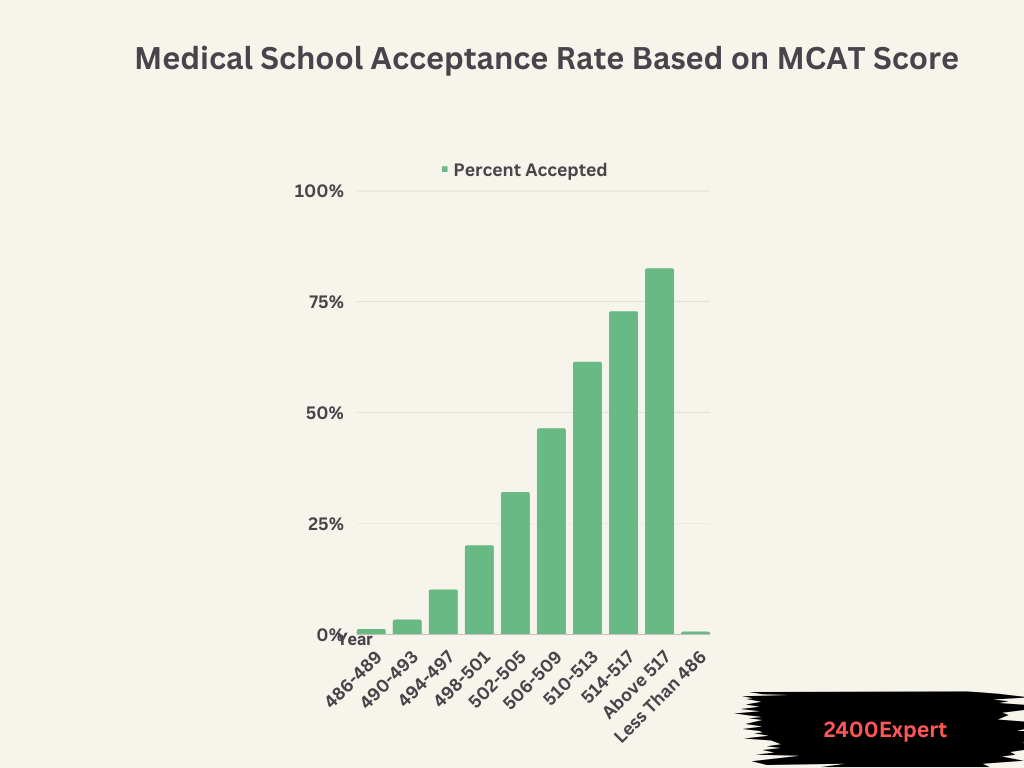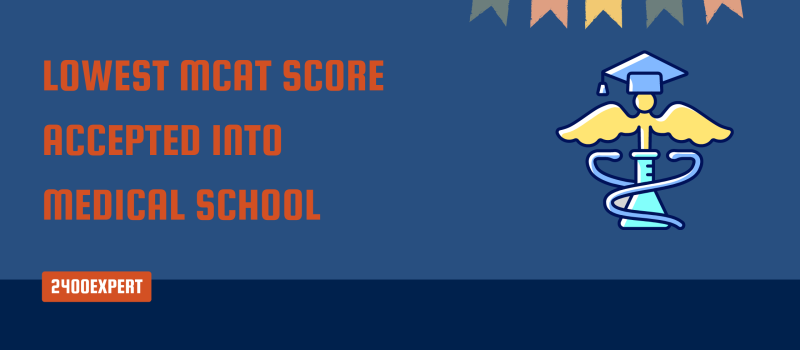Disappointed with your MCAT score? You are not the first person to feel this way.
It’s easy to lose focus on your MCAT score amidst all the upheaval. Although you may retake the MCAT, you might need more time to do so this year due to the difficulty of the exam. So, what are your options?
There are a few medical schools accepting scores on the lower end of the MCAT range, which would be a sigh of relief for you.
Some colleges don’t even require the MCAT to apply to medical school. In this post, we will discuss numerous paths that can be taken by medical students whose MCAT scores are less than average.
Worry not about the MCAT score, instead learn everything about how your application can be accepted, even though MCAT is not mandatory to get an entry.
So, Let’s get started.
What Is The MCAT?
The MCAT is an extensive exam regulated by the Association of American Medical Colleges (AAMC) that assesses an applicant’s knowledge and critical thinking abilities.
The test comprises four sections that include
- Chemical and Physical Foundations of Biological Systems.
- Biological and Biochemical Foundations of Living Systems.
- Social, Psychological, and Biological Foundations of Behavior.
- Critical Analysis and Reasoning Skills.
These sections reflect the core competencies that are essential for success in medical school.
Lowest MCAT Score Accepted Into Medical School
The lowest MCAT score accepted into medical school varies by school. However, according to the Association of American Medical Colleges (AAMC), the average MCAT score for matriculants to medical school in 2024 was 510.5.
This means that half of all matriculants scored above 510.5, and half scored below.

It is important to note that the MCAT is just one factor that medical schools consider while deciding on their admissions.
Other factors include GPA, extracurricular activities, letters of recommendation, and personal statement. Therefore, even with a low MCAT score, you may still be competitive for medical school admission if you have strong scores in other areas.
How Is MCAT Scored?
The MCAT is scored on a scale of 472 to 528, with a mean of 500. The exam is divided into four sections:
- Biological and Biochemical Foundations of Living Systems (BB)
- Critical Analysis and Reasoning Skills (CARS)
- comprehensive background in Science’ (CBBS)
- Psychological, Social, and Biological Foundations of Behavior (PS)
Each section is scored on a scale of 118 to 132, with a mean of 125. The total MCAT score is the sum of the four section scores.
The MCAT is a challenging exam, but preparing for the exam is possible. There are many resources available to help you prepare, including MCAT prep books, online courses, and tutoring services.
Best Medical Schools With Low MCAT Scores
Here are some of the best medical schools with low MCAT scores:
| School Name | Average MCAT Score |
| University of New Mexico School of Medicine | 503 |
| East Carolina University Brody School of Medicine | 504 |
| The University of Mississippi Medical Center | 504 |
| University of Kentucky College of Medicine | 505 |
| University of Puerto Rico School of Medicine | 505 |
Factors Considered In Medical School Admissions
Medical-School Admissions committees evaluate applicants based on a combination of factors to ensure they select individuals who will thrive in their programs. These factors may include:
1. Academic Performance:
Admissions committees review an applicant’s academic record, including undergraduate coursework, GPA, and science-related courses, to gauge their intellectual capabilities and academic preparedness.
2. MCAT Score:
The MCAT score provides admissions committees with a standardized metric to compare applicants’ knowledge and aptitude. It helps them assess an applicant’s ability to handle the rigorous coursework in medical school.
3. Clinical Experience:
Clinical experience, such as volunteering or shadowing healthcare professionals, is important because it shows your commitment to the field and gives you a better understanding of what it’s like to work in medicine.
4. Letters Of Recommendation:
Letters of recommendation from professors or healthcare professionals who can speak to your character and potential as a future physician can also be a valuable asset.
5. Personal Statement:
Crafting a well-written personal statement is another important aspect of your application.
This is your opportunity to showcase your motivations, experiences, and personal qualities and help the admissions committee understand what makes you unique
Medical School Acceptance Rate Based on MCAT Score
Please take into account that a remarkable performance on the MCAT does not offer guaranteed admission to medical school.
To demonstrate this point, let us examine the compiled acceptance rates for applicants based on their MCAT scores, as reported by the Association of American Medical Colleges.

| MCAT Score Range | Percent Accepted |
| 486-489 | 1.1% |
| 490-493 | 3.2% |
| 494-497 | 10% |
| 498-501 | 20% |
| 502-505 | 32% |
| 506-509 | 46.4% |
| 510-513 | 61.4% |
| 514-517 | 72.8% |
| Above 517 | 82.5% |
| Less than 486 | 0.5% |
As evident from the data, achieving a higher MCAT score significantly enhances your likelihood of acceptance.
In general, individuals with lower MCAT scores should strive to compensate by presenting a higher GPA to maintain a well-rounded academic profile.
Nevertheless, it is crucial to recognize that medical school admissions committees evaluate applications in a comprehensive manner, considering various factors.
Hence, your experiences, personal statement, work and activities entries, secondary essays, and interview performance play a pivotal role in determining your success in the application process.
Where Should I Apply to Medical School Based on My MCAT Score?
While the MCAT score is a pivotal aspect, it is important to consider multiple factors during the application process.
Admissions committees take a comprehensive approach to evaluating applicants, considering various elements of their profile.
Based on your MCAT score, here are some guiding principles to assist you in choosing the appropriate medical schools:
- MCAT of 505 or below:
If your MCAT score falls within this range, it is advisable to consider applying to both your state allopathic medical schools and osteopathic medical schools.
State schools often prioritize in-state applicants, and osteopathic schools can offer additional opportunities for acceptance.
- MCAT score ranges from 506 – 509:
For applicants with MCAT scores ranging from 506 to 509, it is recommended to apply to your state medical schools.
Additionally, consider applying to a select number of additional allopathic medical schools and 15-20 osteopathic medical schools. Expanding your choices will increase the likelihood of receiving multiple interview invitations.
- MCAT score ranges from 510 – 514:
If your MCAT score falls within this range, apply to your state medical schools and carefully choose 25-30 allopathic medical schools.
Based on other factors in your profile, consider applying to the best osteopathic medical schools as well. A competitive MCAT score combined with a well-rounded application will strengthen your chances of acceptance.
- MCAT of 514 or higher:
Applicants with an MCAT score of 514 or higher should focus on applying to their state medical schools and 25 allopathic medical schools.
As your MCAT score increases, it is important to consider more selective institutions. Emphasize applying to medical schools that align with your academic goals and provide opportunities for further growth and development.
Tips For Getting Into Med School With A Low MCAT Score
Getting into medical school with a low MCAT score can be challenging, but it’s not impossible. Here are some tips to help improve your chances:
- Focus on Your Overall Application:
Medical schools take your application into account seriously. To show that you have the potential to become a doctor, you need to work on your GPA, extracurricular activities, personal statement, and letters of recommendation.
- Highlight Your Strengths:
Put a focus on your exceptional accomplishments, experiences, and traits. Showcase your passion for medicine by your involvement in leadership positions, research, or other noteworthy accomplishments.
- Consider a Post-baccalaureate Program:
Enrolling in a post-baccalaureate program can enhance your academic record, take advanced science courses, and demonstrate your ability to excel. A strong performance in such a program can offset a lower MCAT score.
- Apply to a Diverse Range of Medical Schools:
Apply to a variety of medical schools that fit your objectives and profile. Look into the goals, principles, and admission standards of each institution to find out which would be more accommodating to candidates with lower MCAT scores.
- Consider Retaking the MCAT:
If you think you may improve your MCAT score, you might want to retake the test. Retake it only if you are well-prepared and think you can significantly improve your score. Be mindful of the dangers that can arise from taking the test more than once.
- Seek Support and Guidance:
Make contact with pre-med advisors, mentors, or experts who can offer insightful advice during the application process.
Their knowledge can assist you in planning ahead and navigating the particular difficulties that come with applying with a subpar MCAT score.
Related Read:
- What Is A Bad SAT Score?
- What is an Average ACT Score
- What Is A Good GRE Score
- What is a Good ACT Score?
- What Is The NCLEX Passing Score
Conclusion: Lowest MCAT Score Accepted Into Medical School (2024)
If your MCAT score is lower than average, you may need to make up for it in other areas of your application to medical school.
However, it is not impossible to acquire admission to a medical school with a below-average MCAT score. Remember that admissions committees at medical schools will always consider the whole person.
You should work on your GPA, extracurricular activities, and résumé by gaining research experience, shadowing, and/or internships if your MCAT score is poor.
It is also possible to retake the MCAT at any time.
Choosing a medical school is a major life decision; therefore, prospective students should take their time and focus on institutions they can envision themselves attending rather than focusing just on courses that accept low MCAT scores.
The old adage “slow and steady wins the race” holds true here.
Good Luck!
FAQs
While it can be challenging, it is possible to get into medical school with a low MCAT score. Admissions committees consider multiple factors when evaluating applicants, so a low MCAT score can be offset by other strong aspects of your application.
If your MCAT score is below the average for medical schools, there are several steps you can take. Consider retaking the MCAT to improve your score, focus on strengthening other areas of your application, explore schools known for accepting students with lower MCAT scores, and gain additional clinical experience or academic enhancement through post-baccalaureate programs.
Yes, considering less competitive medical schools can be a good strategy if your MCAT score is low. Research and identify medical schools with more lenient score requirements and apply to a diverse range of schools, including reach, target, and safety schools, to increase your chances of acceptance.
